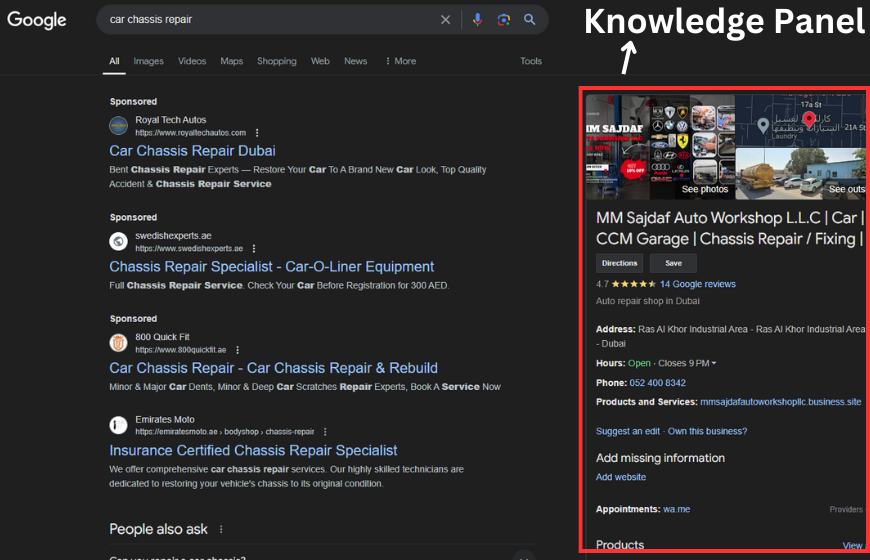How to Rank on Google Knowledge Panel: A Practical Guide Using PAS Framework

In the age of search engines, having your brand appear on Google’s Knowledge Panel can be a game changer. If you’re not leveraging this powerful tool, you’re missing out on increased visibility, authority, and the trust that comes with it. So, how do you rank on Google Knowledge Panel? In this blog post, we’ll walk you through a comprehensive, actionable strategy using the PAS copywriting framework—Problem, Agitation, and Solution. No fluff, no over-the-top adjectives—just factual, data-driven insights from existing case studies to help you claim your spot on Google’s coveted panel.
The Problem: Lack of Control Over Your Online Presence
Every business or individual trying to make a mark on the digital front faces one major challenge: controlling how they are represented online. Even if you rank well on search results, the content displayed is often scattered and inconsistent across platforms like social media, Wikipedia, and blogs. Worse, some of that content might be inaccurate or incomplete.
If your business is highly reliant on credibility and authority, such as doctors, authors, mechanics, and legal professionals, this lack of control can seriously hurt your reputation. Inconsistent online information confuses potential customers, leading to missed opportunities, lost revenue, and eroded trust.
Imagine a scenario where someone searches for your business, and instead of seeing cohesive, clear information, they find fragmented results from multiple sources. Even worse, they might come across negative reviews or misinformation at the top of the search results.
That’s where the Google Knowledge Panel steps in.
This box of essential, verified information can give users a complete snapshot of who you are, what you do, and why they should trust you. The Knowledge Panel is the curated, controlled narrative that makes the difference between appearing as a scattered entity versus a professional, reputable one.
But here’s the issue: ranking on the Google Knowledge Panel isn’t straightforward. It’s not like simply improving your SEO rankings. There’s no “pay-to-play” option, and you need to earn your way onto it. This brings us to the agitation part.
The Agitation: The Challenges of Appearing on Google Knowledge Panel
Ranking on the Google Knowledge Panel requires more than just good SEO practices or social media presence. You can’t simply write a blog post and expect your brand to pop up in the panel tomorrow. The competition for these panels is fierce, and Google’s algorithm is notoriously selective. But here’s where things get sticky:
Google demands accuracy and authority. This means your information has to be consistently available across various authoritative platforms, such as Wikipedia, Wikidata, and reputable databases.
There’s no direct submission process. Unlike Google My Business, you can’t just sign up and ask for a Knowledge Panel. You have to build enough credibility through indirect means for Google to select you as deserving of one.
The content requirements are stringent. Google doesn’t allow you to dictate what goes in the panel unless you’re a verified entity, and even then, control is limited. The algorithm pulls from various trustworthy sources, so any gaps or inaccuracies in your online data may result in Google not trusting your brand enough to display a panel.
It’s highly competitive. You’re not just fighting for a spot in organic search results; you’re also competing with other entities in your industry to be chosen for a Knowledge Panel.
So, how do businesses and professionals overcome these challenges? That’s where the solution part comes in.

The Solution: Proven Steps to Rank on Google Knowledge Panel
The Solution: Proven Steps to Rank on Google Knowledge Panel
Now that we’ve identified the problem and challenges, let’s dive into actionable strategies to help you secure a spot on the Google Knowledge Panel. These strategies are derived from existing case studies and follow proven methods that have worked for many brands.
1. Build Authoritative Digital Profiles
The first step to earning a spot on the Knowledge Panel is to ensure that your digital footprint is visible and credible. Google pulls information from trusted, authoritative sources, which means you need to have profiles on the platforms Google trusts most.
Wikipedia: This is one of Google’s primary sources of information. Ensure you have a well-referenced Wikipedia page that accurately represents your brand. Include third-party references, reputable articles, and high-quality sources to back up your claims. Wikipedia articles that lack citations or include biased content can be flagged or removed, so make sure yours stands up to scrutiny.
Wikidata: This lesser-known platform is crucial for Google’s Knowledge Graph. Add structured data about your brand, including names, dates, locations, and other verifiable details. Wikidata serves as a backbone to many online platforms, including Google.
Google My Business (GMB): For local businesses, Google My Business is essential. Make sure your GMB profile is complete and up-to-date with photos, hours, and reviews. More importantly, claim your GMB Knowledge Panel once it appears and optimize it regularly.
Social Media: Social signals matter, and they contribute to your overall authority. Ensure your business’s profiles on LinkedIn, Twitter, Instagram, and Facebook are active, verified, and consistent with your Wikipedia and GMB entries.
2. Establish Consistent NAP Data (Name, Address, Phone Number)
One of the most common reasons businesses struggle to get a Knowledge Panel is inconsistent NAP (Name, Address, Phone Number) data across online platforms. Google values consistency, so ensuring that your NAP information is exactly the same on your website, GMB, and across all directories like Yelp, Yellow Pages, and other industry-specific listings is crucial.
Google’s algorithm cross-references this data, and inconsistencies can confuse the search engine, leading to reduced trust in your brand’s accuracy.
3. Build Quality Backlinks and Citations
Another major factor for appearing in the Google Knowledge Panel is the number and quality of backlinks and citations pointing to your brand. Google uses these signals to gauge authority.
High-quality citations: Make sure your brand is mentioned or cited in high-authority websites. This includes news outlets, industry journals, and top-tier blogs.
PR Efforts: Publish press releases and engage in public relations to get mentions from media sources. The more authoritative sites mention your brand, the more signals Google receives about your credibility.
For example, a case study from a personal injury law firm in the U.S. showed that earning mentions on large media outlets like Forbes and CNN significantly improved their chances of getting featured in the Knowledge Panel.
4. Structured Data Markup on Your Website
Structured data markup is a powerful tool that allows you to tell Google exactly what your site is about in a language it understands. Using Schema.org markup, you can provide Google with structured information about your business, products, services, and even employees. By clearly defining key details about your business, you increase the chances of Google recognizing you as an authoritative entity.
For instance, a restaurant in New York integrated proper structured data into their website, clearly listing their address, phone number, menu, and reviews using schema markup. As a result, they appeared in Google’s local Knowledge Panel within months.
5. Optimize Your Content for E-A-T (Expertise, Authority, Trustworthiness)
Google’s algorithm heavily relies on E-A-T factors when considering whether a brand should be featured in the Knowledge Panel. These factors are also critical in SEO, but even more so when it comes to appearing in authoritative spaces like the Knowledge Panel.
Expertise: Publish content that showcases your in-depth knowledge. Write articles, blogs, or whitepapers that demonstrate your expertise in your field. This will boost your credibility in the eyes of both users and Google’s algorithm.
Authority: Get mentions from authoritative sites and have well-researched, cited content. The more trustworthy and authoritative websites link to or reference your business, the higher your chances of ranking on the Knowledge Panel.
Trustworthiness: Ensure your online presence is professional and error-free. Negative reviews or inconsistent information hurt your trust score. Regularly monitor your online reputation to ensure it’s always positive.
6. Claim and Optimize Your Knowledge Panel
Once you’ve earned your spot on the Google Knowledge Panel, the work isn’t over. You need to claim your panel to have any control over the information displayed. Here’s how to do it:
- Search for your business or name on Google.
- If you have a Knowledge Panel, there will be an option that says, “Claim this knowledge panel.” Click it.
- Verify your identity or association with the business using Google’s verification process (often through social media or official website links).
- Once verified, you can suggest changes and updates to ensure the information is always correct.
Case Study: A Small Business’s Journey to the Knowledge Panel
Take the example of a small accounting firm in Dallas. The firm had been around for over a decade, but its online presence was minimal. After undergoing the steps mentioned above, including creating a Wikipedia page, optimizing GMB listings, building structured data, and gaining citations from industry journals, the firm eventually appeared on the Google Knowledge Panel within 8 months.
The firm saw a 50% increase in organic leads, as their credibility and visibility skyrocketed, simply because users could instantly get the most essential and accurate information about them right from the Google search page.
Conclusion: Your Path to the Google Knowledge Panel
The path to ranking on Google’s Knowledge Panel requires consistent effort, credibility, and a clear digital strategy. By building authoritative profiles, ensuring data consistency, earning quality backlinks, and optimizing your content for Google’s E-A-T factors, you can significantly increase your chances of being recognized by Google’s algorithm.
Don’t expect overnight success—this is a gradual process. But with the right steps and a commitment to





